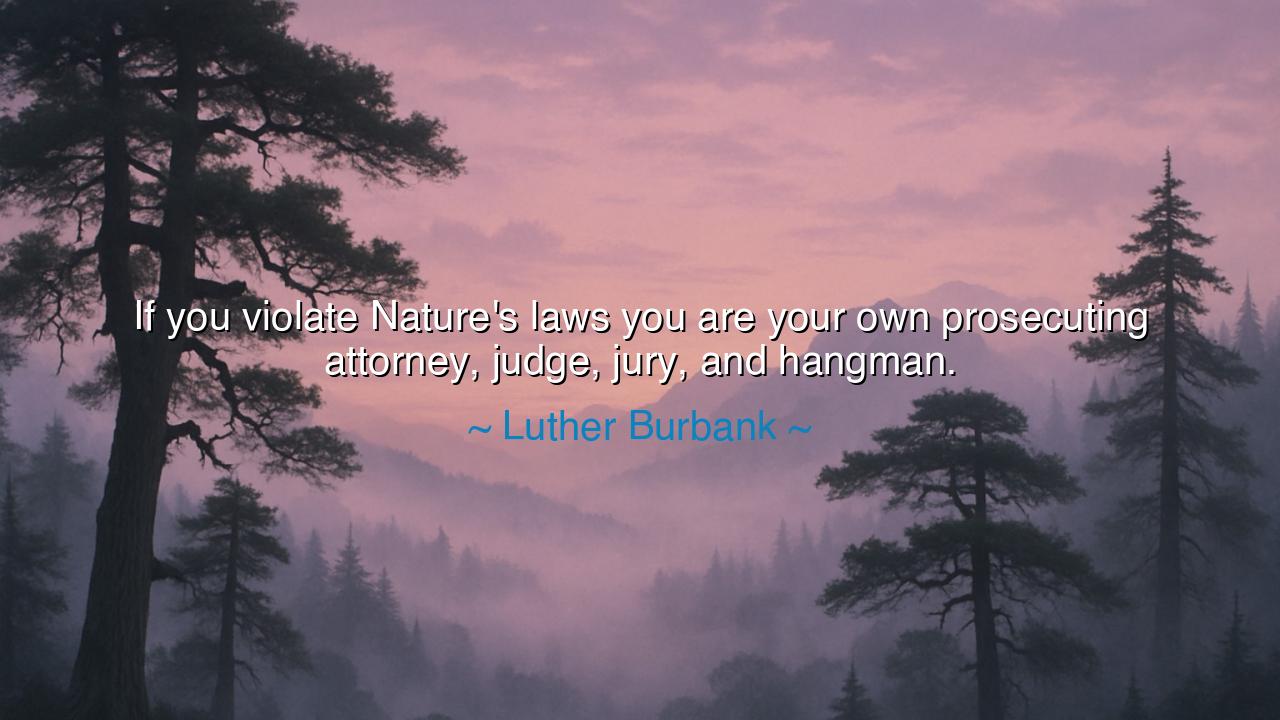
If you violate Nature's laws you are your own prosecuting
If you violate Nature's laws you are your own prosecuting attorney, judge, jury, and hangman.






Hearken, children of the ages, and attend to the solemn words of Luther Burbank, who, gazing upon the world with the eyes of a cultivator and a sage, proclaimed: "If you violate Nature's laws you are your own prosecuting attorney, judge, jury, and hangman." Herein lies a meditation upon the inescapable authority of natural law and the immutable consequences of defying the order that sustains life. Burbank warns that no human craft or cunning can exempt one from the judgment of the cosmos, for Nature itself enforces its decrees with impartial rigor.
To violate Nature's laws is to act in ignorance or arrogance, assuming dominion over forces far older, wiser, and more powerful than human ambition. Water, soil, seed, and sun follow eternal patterns; defiance of these rhythms invites inevitable consequence. Burbank’s words remind us that the natural world is neither benevolent nor malevolent—it is impartial. Those who disregard its laws, in their gardens, their communities, or their nations, find that justice is swift and inescapable, administered by the very forces they sought to command.
Consider the historical example of deforestation in Easter Island, where the once-great civilization ignored the balance of its environment. Trees were felled relentlessly, soil eroded, and resources depleted. The people, blind to the consequences of violating ecological laws, became the architects of their own ruin. In this tragic tale, they served as their own prosecuting attorney, judge, jury, and hangman, and Nature carried out her verdict with unerring impartiality. Burbank’s caution resonates across centuries: defiance of natural order brings consequences beyond human negotiation.
Burbank’s metaphor also illuminates personal responsibility. To act against the laws of Nature is to invite retribution not from others, but from the consequences intrinsic to one’s own choices. Ignorance, greed, and neglect may shield the individual from immediate judgment, but ultimately, the balance will be restored. Just as a gardener who overwaters or starves a plant suffers the loss of growth and harvest, so too does the human spirit suffer when it disregards the universal laws that govern life and harmony.
The observation extends to the moral and ethical realms as well. Those who exploit, deceive, or harm without regard for the natural order create systems that will ultimately rebound upon them. Pandemics, famines, and environmental disasters are the collective manifestations of individual violations of natural laws. Burbank warns that in attempting to evade accountability, we only assume the role of all offices of judgment ourselves—our choices becoming both crime and punishment.
Consider the modern example of industrial pollution in the 20th century, where rivers were fouled and air choked by unchecked factories. The immediate gains of commerce and convenience were outweighed by the slow, relentless consequences: disease, ecological collapse, and climate disruption. Humanity, in its arrogance, became both accuser and adjudicator, suffering the consequences of its own violations. The natural world exacts justice with precision and impartiality.
The lesson is profound: cultivate reverence for Nature's laws, for they are neither arbitrary nor negotiable. Harmony with the earth ensures health, prosperity, and longevity; defiance invites suffering, loss, and accountability. Burbank teaches that responsibility is inseparable from action, and that wisdom lies in observing, respecting, and working in accordance with the principles that govern life and growth.
Practical action follows naturally: study the rhythms of Nature, tend gardens and lands with care, conserve water and soil, and honor the interdependence of all life. Recognize that every violation, however small, carries consequences that will be borne. Act with foresight and humility, acknowledging that Nature administers judgment impartially, and that to live wisely is to align human will with the eternal order of the world.
Thus, Luther Burbank’s words endure as both warning and counsel: he who violates Nature's laws becomes both author and executor of his own fate. Let all who hear remember that the earth’s rules are not negotiable, and that true wisdom lies in obedience, harmony, and respect for the immutable power that sustains all life.
If you wish, I can also craft a poetic, audio-ready version of this passage, where the cadence mirrors the inexorable authority of Nature and the weight of consequence, enhancing the emotional and heroic resonance of Burbank’s insight. Do you want me to do that?






AAdministratorAdministrator
Welcome, honored guests. Please leave a comment, we will respond soon